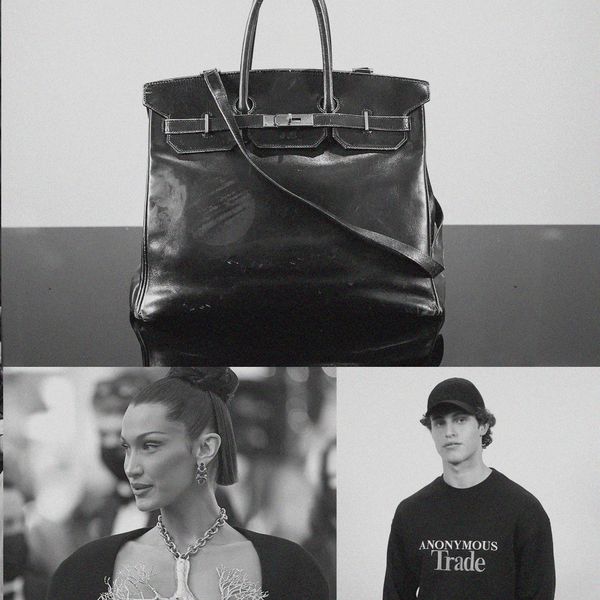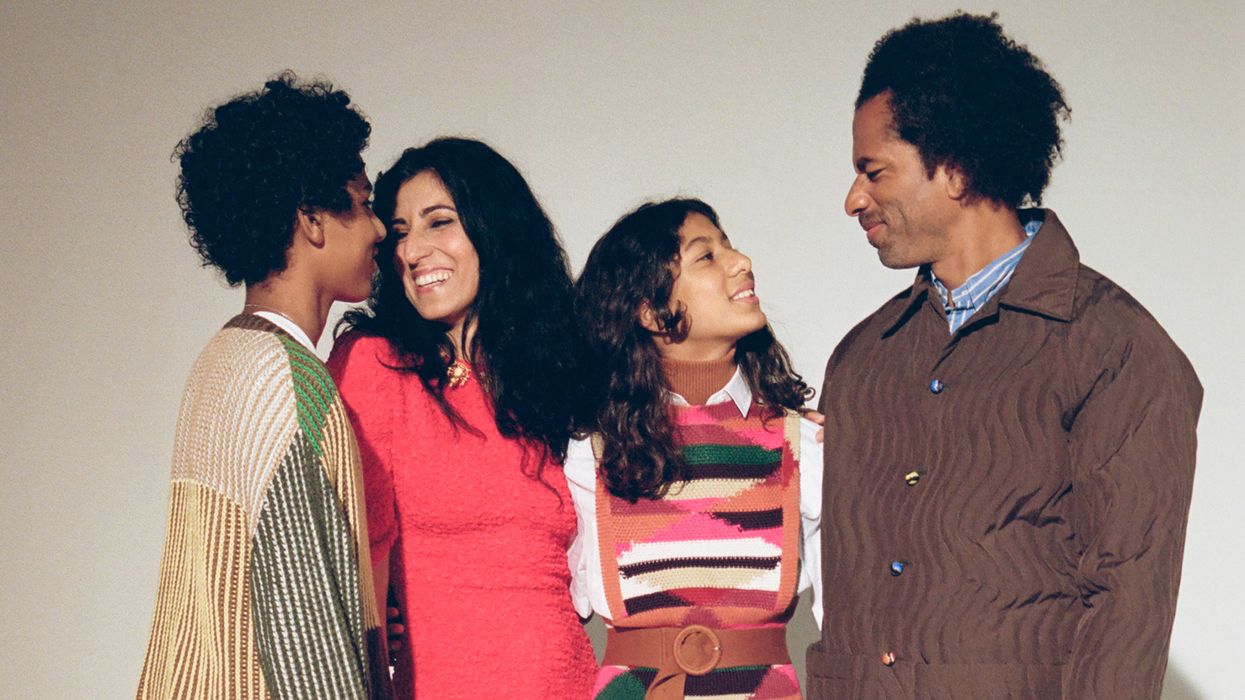
12 February, 2021
Chloe Horseman
Alexis Badiyi
10 November, 2021
Producer
Rachel Pickus
Glam
Mical Klip
Welcome to the Way We Love, a series where we investigate modern love in all its embodiments, whether that be of a romantic relationship, best friends, or family. This Valentine’s Day, we are speaking with four sets of people who experience love in different ways, in different parts of their lives, to better understand why all forms are so vital.
For the second segment of the series, we spoke with Rita Nakouzi and her husband, Touré. Rita, 45, is the editorial director for The RealReal, a luxury e-commerce platform. Touré, 49, is a media creator—a podcaster, writer, television host, etc. They have two children: Hendrix, 13, and Fairuz, 11. The whole family lives together in Brooklyn.
For the second segment of the series, we spoke with Rita Nakouzi and her husband, Touré. Rita, 45, is the editorial director for The RealReal, a luxury e-commerce platform. Touré, 49, is a media creator—a podcaster, writer, television host, etc. They have two children: Hendrix, 13, and Fairuz, 11. The whole family lives together in Brooklyn.
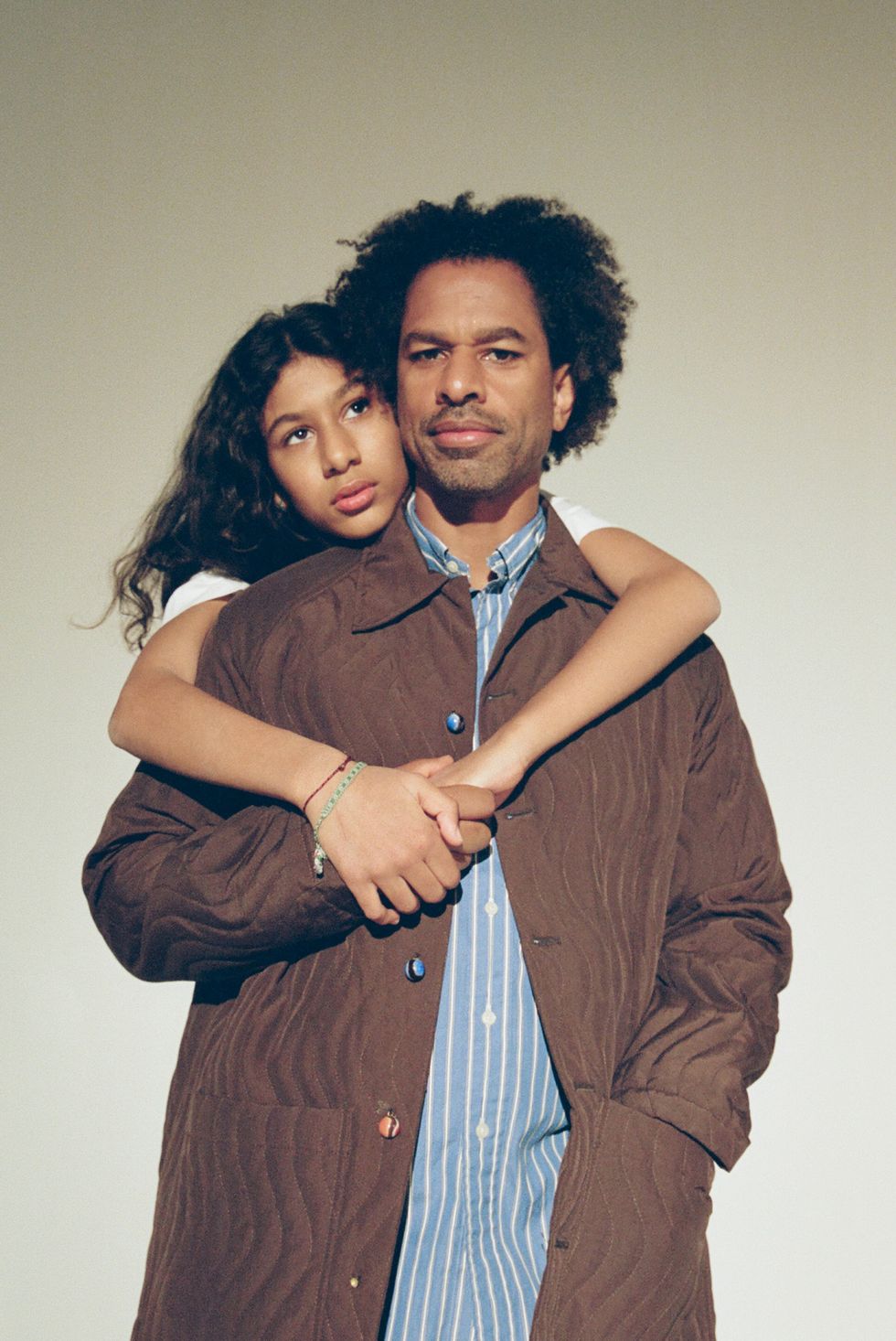
Their family dynamic:
Touré: “We’re all pretty different. My wife and I are very different.”
Rita Nakouzi: “From when we got married, the joke was that we’re so different, it had to work out. We’re like the odd couple. Same with the kids. They’re very different. They take certain things from both of us. It’s so funny.”
T: “There’s a lot of yin and yang. I think what usually brings us together are different games. She and I play backgammon together a lot. I play chess with my son a lot. We try to play Rummikub with the kids. We definitely use games and friendly competition as a way to come together.”
RN: “Recently, my grandmother passed away. She helped raise me. I’m from the Middle East, and there’s this card game we like to play. All three of them were so kind to learn it and really be gentle and generous, making the effort to play with me as I was going through the grieving process. That was really nice.”
Paint us a picture of your quintessential hangout:
RN: “On a Saturday, I like to start the day out with the paper. The kids tend to come to our bed, and we like to do the Spelling Bee and the Crossword together. They love reading Social Q’s. On Sundays we like to do the weekly news quiz. So we kind of start the day that way. Then we go to the market, get breakfast there, and pick up all the provisions to come home and cook. My daughter is getting us into the habit of eating together because we all have such different tastes. Usually, everyone’s eating something different. She really likes family lunches or dinners, so we try to do that on the weekend, you know, cook and eat together.”
T: “Again, playing games. We play a couple games of Rummikub and then that dissolves into the kids screwing around while we’re playing backgammon together. We’re both pretty good and it gets pretty fierce in terms of the competition and the shit-talking. There’s definitely times when I might be losing to her and then I’ll turn it around and be about to beat her, call one of the kids in from the other room and be like, ‘Oh, look who is winning. It’s Daddy!’ And she’ll be like, ‘I hate you for saying that.’ So that’s always fun.”
Touré: “We’re all pretty different. My wife and I are very different.”
Rita Nakouzi: “From when we got married, the joke was that we’re so different, it had to work out. We’re like the odd couple. Same with the kids. They’re very different. They take certain things from both of us. It’s so funny.”
T: “There’s a lot of yin and yang. I think what usually brings us together are different games. She and I play backgammon together a lot. I play chess with my son a lot. We try to play Rummikub with the kids. We definitely use games and friendly competition as a way to come together.”
RN: “Recently, my grandmother passed away. She helped raise me. I’m from the Middle East, and there’s this card game we like to play. All three of them were so kind to learn it and really be gentle and generous, making the effort to play with me as I was going through the grieving process. That was really nice.”
Paint us a picture of your quintessential hangout:
RN: “On a Saturday, I like to start the day out with the paper. The kids tend to come to our bed, and we like to do the Spelling Bee and the Crossword together. They love reading Social Q’s. On Sundays we like to do the weekly news quiz. So we kind of start the day that way. Then we go to the market, get breakfast there, and pick up all the provisions to come home and cook. My daughter is getting us into the habit of eating together because we all have such different tastes. Usually, everyone’s eating something different. She really likes family lunches or dinners, so we try to do that on the weekend, you know, cook and eat together.”
T: “Again, playing games. We play a couple games of Rummikub and then that dissolves into the kids screwing around while we’re playing backgammon together. We’re both pretty good and it gets pretty fierce in terms of the competition and the shit-talking. There’s definitely times when I might be losing to her and then I’ll turn it around and be about to beat her, call one of the kids in from the other room and be like, ‘Oh, look who is winning. It’s Daddy!’ And she’ll be like, ‘I hate you for saying that.’ So that’s always fun.”
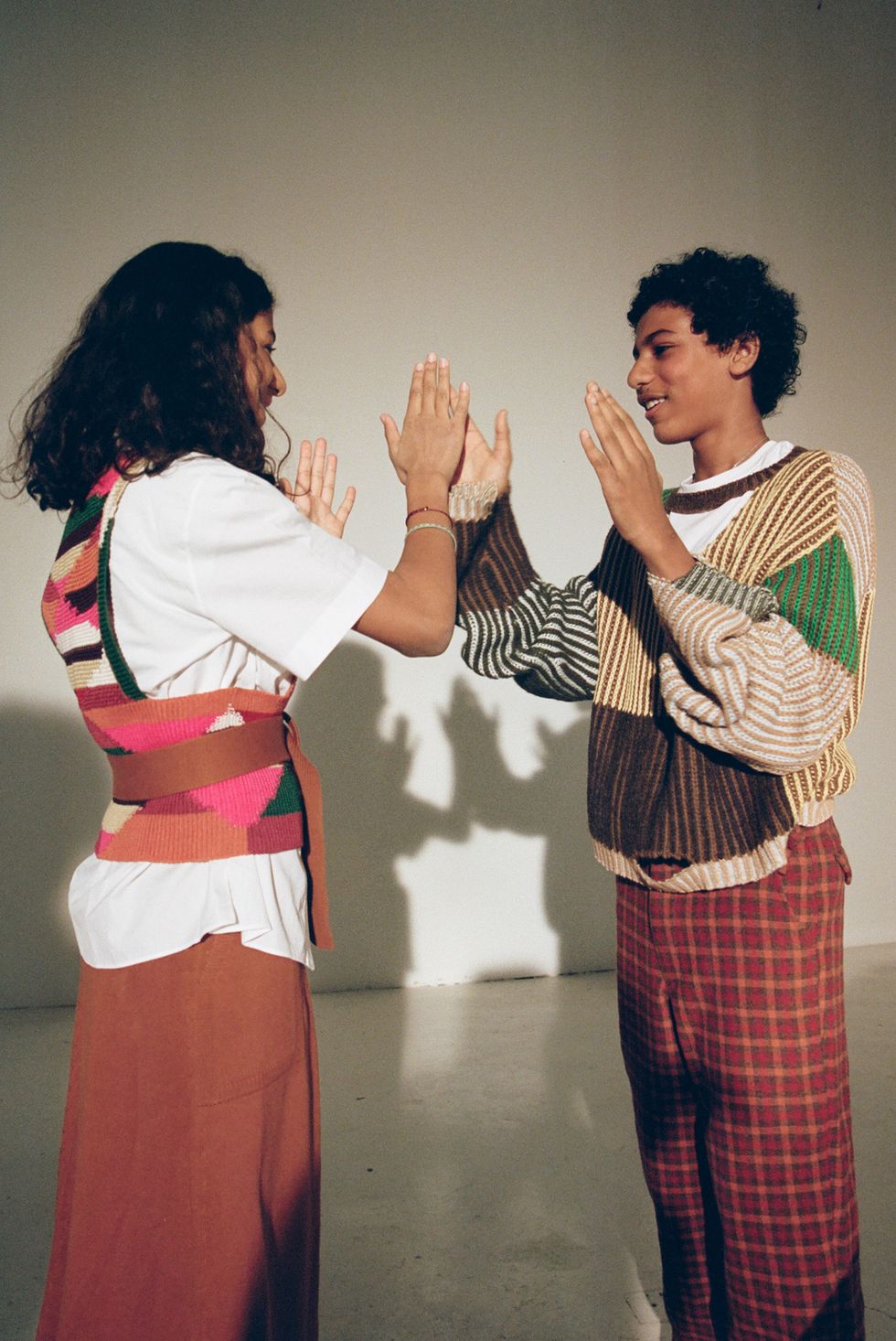
Can you put the way it feels to love and to be loved by your family into words?
RN: “There’s definitely an element of pure acceptance. I’m sure everyone says this, but I thought I knew what love was. Then the act of giving birth and that first moment you hold your child, it presents you with a love I did not fathom, like I had no idea. It’s interesting how that then ends up informing so much of who you become after that. The act of giving birth is a passage. There is a passage of your capacity to love, how that manifests after giving birth and how you end up behaving and showing up in the world. I think it’s acceptance but also a profound loyalty and love that manifests.”
T: “It’s hard to say what it feels like. I’m not really sure how to articulate that. I just know that I love them and that they love me.”
On the love of a child versus that of your partner:
T: “They are children. She is my peer and my partner. I’m not teaching her. She is who she is. I am here to teach them. The relationships are entirely different. These children are growing and changing all the time. What they need is changing. In a lot of ways, you fulfill your responsibility as a parent and that is a reflection of your love. Picking them up for school, buying and making them food, taking care of them even if you’re tired or you don’t really want to. That is an expression of your love. The work of taking care of them day after day is an expression of your love.”
RN: “For me, they’ve become very tied to one another in a way. The love of your children is so profound that you have a larger sense of wanting to have that expansive love for your partner, if that makes sense. It makes that relationship that much more profound because you feel like you’re invested even more in a responsibility to show them what love could look like and therefore what healthy love is. How we treat each other becomes that much more important, how we love each other or how we disagree. You see your relationship with your partner through a different lens, so then in a weird way it all becomes super intertwined.”
RN: “There’s definitely an element of pure acceptance. I’m sure everyone says this, but I thought I knew what love was. Then the act of giving birth and that first moment you hold your child, it presents you with a love I did not fathom, like I had no idea. It’s interesting how that then ends up informing so much of who you become after that. The act of giving birth is a passage. There is a passage of your capacity to love, how that manifests after giving birth and how you end up behaving and showing up in the world. I think it’s acceptance but also a profound loyalty and love that manifests.”
T: “It’s hard to say what it feels like. I’m not really sure how to articulate that. I just know that I love them and that they love me.”
On the love of a child versus that of your partner:
T: “They are children. She is my peer and my partner. I’m not teaching her. She is who she is. I am here to teach them. The relationships are entirely different. These children are growing and changing all the time. What they need is changing. In a lot of ways, you fulfill your responsibility as a parent and that is a reflection of your love. Picking them up for school, buying and making them food, taking care of them even if you’re tired or you don’t really want to. That is an expression of your love. The work of taking care of them day after day is an expression of your love.”
RN: “For me, they’ve become very tied to one another in a way. The love of your children is so profound that you have a larger sense of wanting to have that expansive love for your partner, if that makes sense. It makes that relationship that much more profound because you feel like you’re invested even more in a responsibility to show them what love could look like and therefore what healthy love is. How we treat each other becomes that much more important, how we love each other or how we disagree. You see your relationship with your partner through a different lens, so then in a weird way it all becomes super intertwined.”
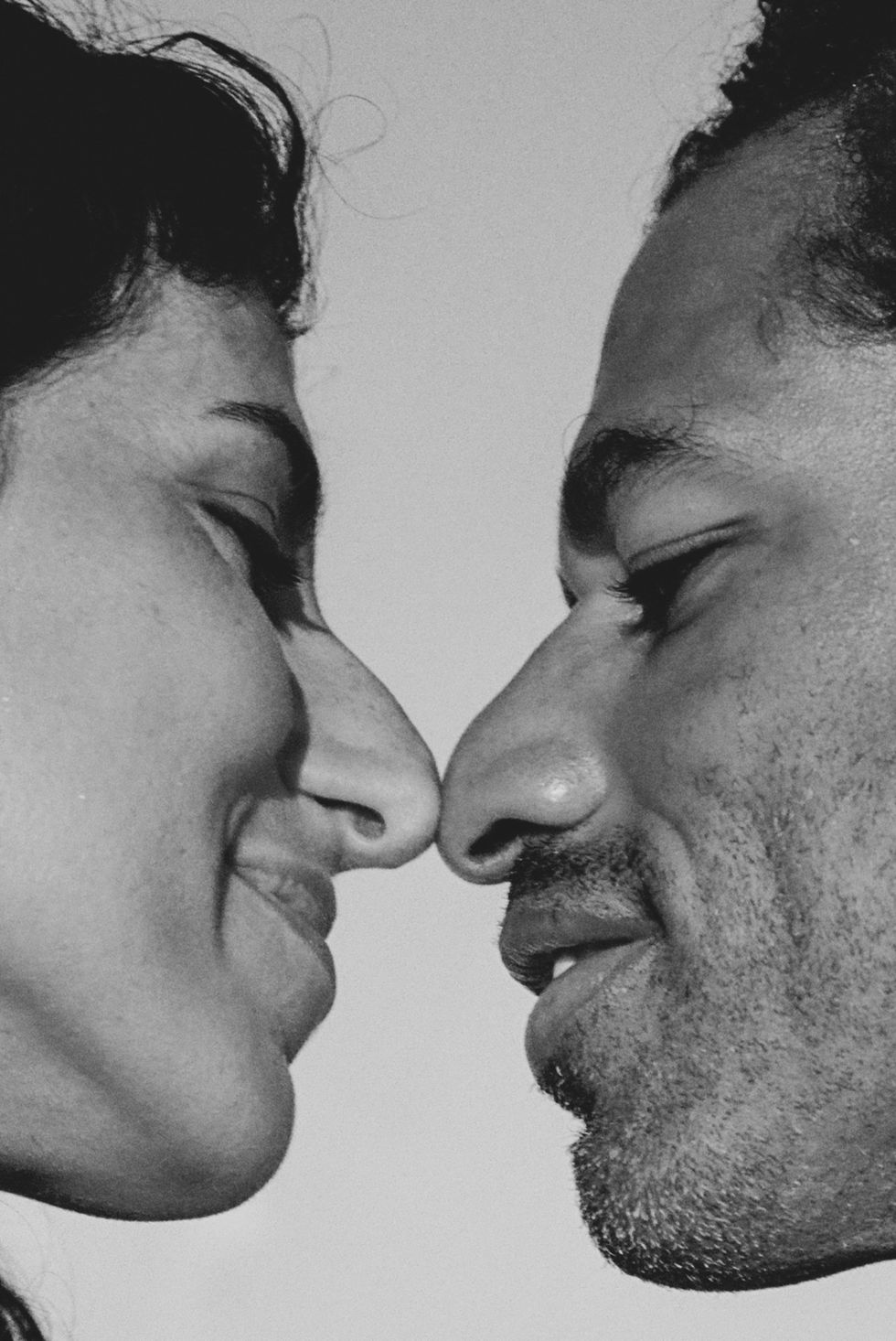
How they show love:
RN: “We did this exercise not too long ago, and we found out we have very different love languages. I think for my husband, it was touch and words. For me, it was service, which is no surprise. If he does the dishes for me or he cleans up, that’s so meaningful.”
T: “I clean up the kitchen every night so that she’s not waking up to a big messy kitchen. I used to work in a restaurant—I mean, it was 25 years ago now—but for me, it’s picking up her plate and carrying it to the kitchen, cleaning it or putting it in the dishwasher. I’m thinking, ‘If you could do this for strangers’—and I wasn’t working in restaurants for that long—‘of course you can do it for someone you love.’ That sort of service I think is just fair. It helps her, and it helps make sure I’m doing my part as a parent and as a partner. That’s part of how I try to show it.”
RN: “It’s so interesting. But until we did that exercise, we had no idea, and we’ve been together 20 years or something. It was funny that we just figured out our love languages are so different.”
T: “I think something as small as watching somebody else’s show or at least giving that show a chance. You can really enjoy a show together. She got into Succession, so then I started watching it. She started putting on Schitt’s Creek last year. I gave it a chance and then I fell in love with it, and now we’re enjoying it together. I think that’s important in showing love. We’re both super into culture, so finding those moments when we can share a television show is fun. It doesn’t always work. She asked me to try Bridgerton. I gave it a try, but I didn’t like it. Sometimes she tries stuff that I like, but on that one, I was like, ‘Sorry, I can’t watch another one of these,’ but it’s cool.”
RN: “I also do two minutes with the kids, which is one of my favorite things at bedtime. Now it’s getting harder because they don’t necessarily want me in the same way. We have two minutes where there are no screens, there’s nothing. We might have a book, otherwise it’s just before bed, just hanging out and talking and just being together. I think it’s meaningful for them, and it’s definitely meaningful to me that they still want me in this way, especially because they’re in their preteen/teens right now. We like to do this thing, it’s like, ‘What’s the rose, what’s the bud, and what’s the thorn of your day?’ So we talk about something good that’s happened, something that’s bothering you, and the bud is something you’re hopeful for.”
RN: “We did this exercise not too long ago, and we found out we have very different love languages. I think for my husband, it was touch and words. For me, it was service, which is no surprise. If he does the dishes for me or he cleans up, that’s so meaningful.”
T: “I clean up the kitchen every night so that she’s not waking up to a big messy kitchen. I used to work in a restaurant—I mean, it was 25 years ago now—but for me, it’s picking up her plate and carrying it to the kitchen, cleaning it or putting it in the dishwasher. I’m thinking, ‘If you could do this for strangers’—and I wasn’t working in restaurants for that long—‘of course you can do it for someone you love.’ That sort of service I think is just fair. It helps her, and it helps make sure I’m doing my part as a parent and as a partner. That’s part of how I try to show it.”
RN: “It’s so interesting. But until we did that exercise, we had no idea, and we’ve been together 20 years or something. It was funny that we just figured out our love languages are so different.”
T: “I think something as small as watching somebody else’s show or at least giving that show a chance. You can really enjoy a show together. She got into Succession, so then I started watching it. She started putting on Schitt’s Creek last year. I gave it a chance and then I fell in love with it, and now we’re enjoying it together. I think that’s important in showing love. We’re both super into culture, so finding those moments when we can share a television show is fun. It doesn’t always work. She asked me to try Bridgerton. I gave it a try, but I didn’t like it. Sometimes she tries stuff that I like, but on that one, I was like, ‘Sorry, I can’t watch another one of these,’ but it’s cool.”
RN: “I also do two minutes with the kids, which is one of my favorite things at bedtime. Now it’s getting harder because they don’t necessarily want me in the same way. We have two minutes where there are no screens, there’s nothing. We might have a book, otherwise it’s just before bed, just hanging out and talking and just being together. I think it’s meaningful for them, and it’s definitely meaningful to me that they still want me in this way, especially because they’re in their preteen/teens right now. We like to do this thing, it’s like, ‘What’s the rose, what’s the bud, and what’s the thorn of your day?’ So we talk about something good that’s happened, something that’s bothering you, and the bud is something you’re hopeful for.”
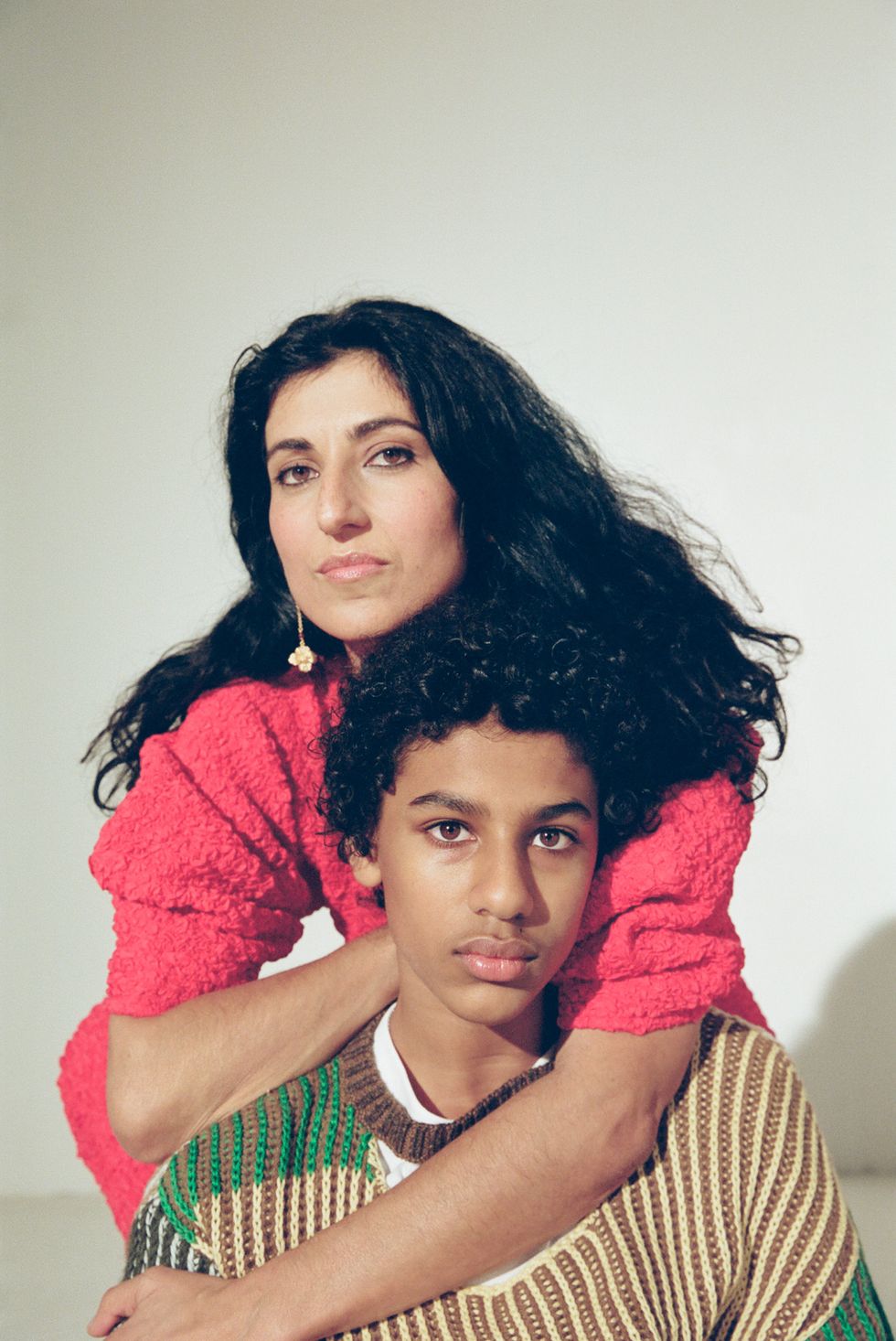
The family’s blend of cultures and how it’s affected them as parents:
RN: “The kids are at an age where they see what’s going on in the world. They were part of Black Lives Matter protests. Breonna, her death in particular, affected my daughter. I think raising a boy who is half Black and half Middle Eastern—he’s definitely been affected. There is an element of heightened sensitivity around feeling protective towards your children in a way that I didn’t expect to be confronting at this age even. There’s something about seeing a teenager get shot because they had a chocolate bar in his hoodie or because his hoodie was up. I have a child who is really tall but so young. It just creates this strange anxiety. I thought at this age what I would be thinking about or reflecting on when it comes to our cultures is like, ‘Oh, you like your fried chicken? How about some hummus?’ Learning about our cultures through the things that bind a culture, like, ‘Let me teach you this game we played as children.’ I didn’t think I’d be having really tough conversations about the history of oppression or how that fits in with their own identity. Also, just wanting them to feel pride in their cultural identity—not to hide that and to be proud of it.”
T: “The issues around Black identity come up all the time in class, in the neighborhood, in society nowadays. Issues around Middle Eastern identity are less prevalent. It’s sort of like I’m part of this loud, larger conversation that dominates modern America. Hers, for whatever reason, is not. So those two issues function differently.”
The importance of having the love of your family:
RN: “It definitely gives me a sense of purpose, but more than anything it challenges me and pushes me to want to be the best version of myself. It definitely highlights and articulates my weaknesses or the areas where I could grow even more so. You feel like you’re under a spotlight because you have this huge responsibility of making sure you’re a good role model for these young minds. You are so aware of the fact that they’re taking more from how you behave than necessarily what you tell them.”
T: “It fills me with a sense of responsibility, no matter how you feel. I have to get my stuff done so that I can take care of them. Especially for a man, providing for a family is how you show love. Just being able to take care of them, to provide for them makes me feel like I am being a good husband and father. Even if you’re not totally feeling it, it will push you out of bed, or push you to keep going, like, ‘I’ve got to get this done, I’ve got to get this done, so that I can take care of them.’”
Photo assistant: Emerald Layne; Stylist assistant: Rashonna Duett; Rita wears Mara Hoffman dress, Reike Nen boots, and Dior necklace and earrings; Touré wears Ralph Lauren shirt, Bode jacket, and his own pant and shoes; Fairuz wears Mara Hoffman dress, Christian Dior sweater and button-up, and Bass mules; Hendrix wears Bode pants, Eckhaus Latta sweater, and Gucci boots.
Want more stories like this?
The Way We Love: Haley and Avi
Everything You Need to Know about the Age of Aquarius
Friends of Coveteur on the Anti-Resolutions They’re Carrying into 2021
RN: “The kids are at an age where they see what’s going on in the world. They were part of Black Lives Matter protests. Breonna, her death in particular, affected my daughter. I think raising a boy who is half Black and half Middle Eastern—he’s definitely been affected. There is an element of heightened sensitivity around feeling protective towards your children in a way that I didn’t expect to be confronting at this age even. There’s something about seeing a teenager get shot because they had a chocolate bar in his hoodie or because his hoodie was up. I have a child who is really tall but so young. It just creates this strange anxiety. I thought at this age what I would be thinking about or reflecting on when it comes to our cultures is like, ‘Oh, you like your fried chicken? How about some hummus?’ Learning about our cultures through the things that bind a culture, like, ‘Let me teach you this game we played as children.’ I didn’t think I’d be having really tough conversations about the history of oppression or how that fits in with their own identity. Also, just wanting them to feel pride in their cultural identity—not to hide that and to be proud of it.”
T: “The issues around Black identity come up all the time in class, in the neighborhood, in society nowadays. Issues around Middle Eastern identity are less prevalent. It’s sort of like I’m part of this loud, larger conversation that dominates modern America. Hers, for whatever reason, is not. So those two issues function differently.”
The importance of having the love of your family:
RN: “It definitely gives me a sense of purpose, but more than anything it challenges me and pushes me to want to be the best version of myself. It definitely highlights and articulates my weaknesses or the areas where I could grow even more so. You feel like you’re under a spotlight because you have this huge responsibility of making sure you’re a good role model for these young minds. You are so aware of the fact that they’re taking more from how you behave than necessarily what you tell them.”
T: “It fills me with a sense of responsibility, no matter how you feel. I have to get my stuff done so that I can take care of them. Especially for a man, providing for a family is how you show love. Just being able to take care of them, to provide for them makes me feel like I am being a good husband and father. Even if you’re not totally feeling it, it will push you out of bed, or push you to keep going, like, ‘I’ve got to get this done, I’ve got to get this done, so that I can take care of them.’”
Photo assistant: Emerald Layne; Stylist assistant: Rashonna Duett; Rita wears Mara Hoffman dress, Reike Nen boots, and Dior necklace and earrings; Touré wears Ralph Lauren shirt, Bode jacket, and his own pant and shoes; Fairuz wears Mara Hoffman dress, Christian Dior sweater and button-up, and Bass mules; Hendrix wears Bode pants, Eckhaus Latta sweater, and Gucci boots.
Want more stories like this?
The Way We Love: Haley and Avi
Everything You Need to Know about the Age of Aquarius
Friends of Coveteur on the Anti-Resolutions They’re Carrying into 2021


